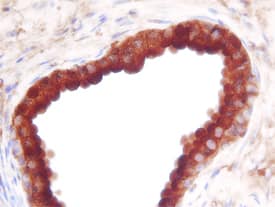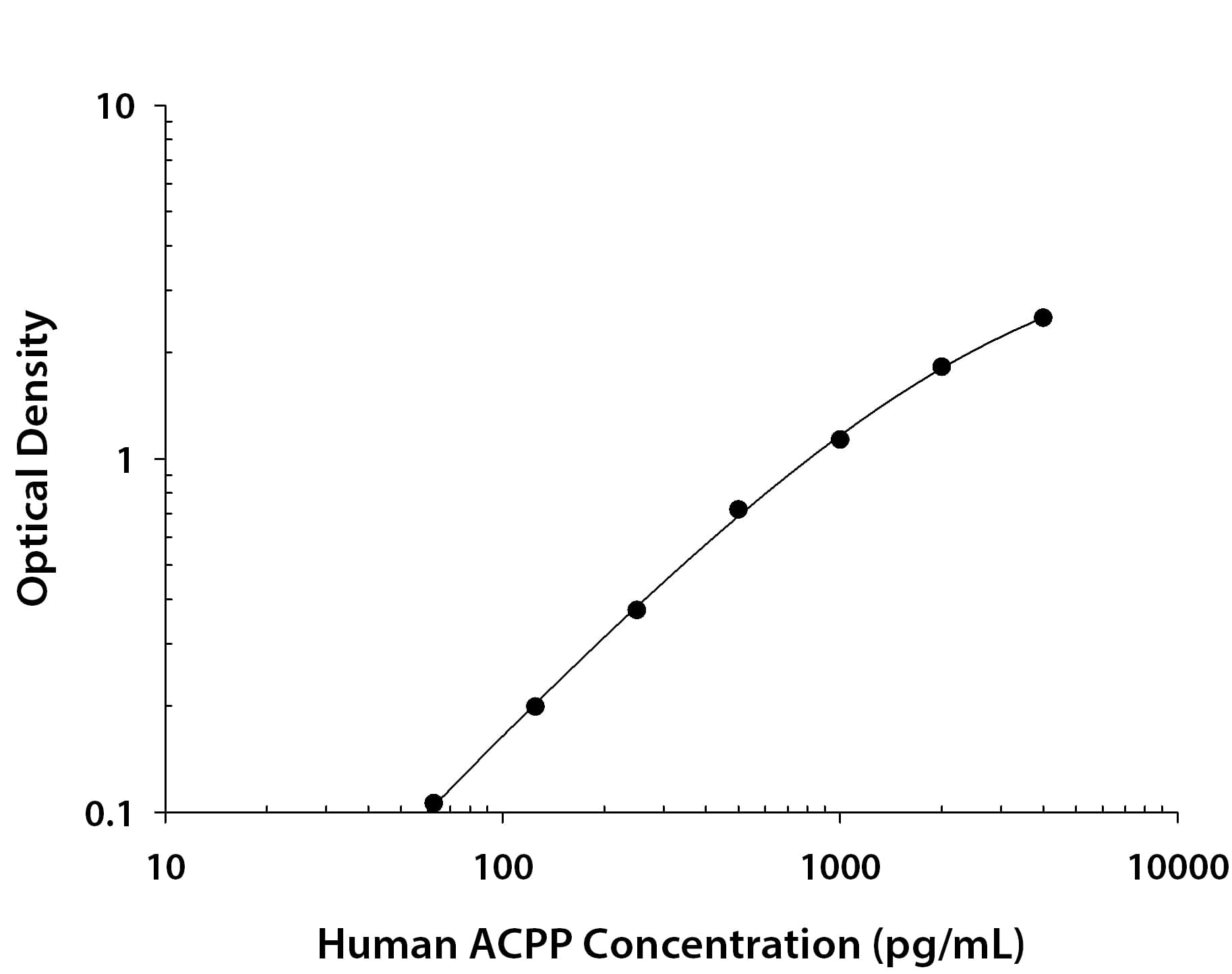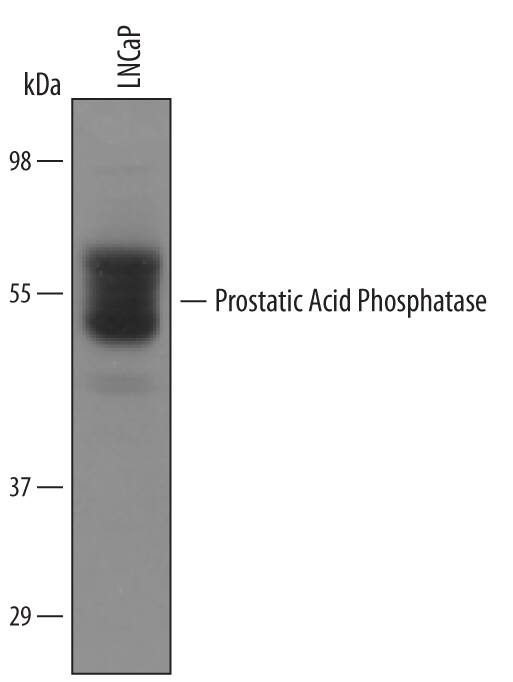Human Prostatic Acid Phosphatase/ACPP Antibody
R&D Systems, part of Bio-Techne | Catalog # AF6240

Key Product Details
Species Reactivity
Validated:
Cited:
Applications
Validated:
Cited:
Label
Antibody Source
Product Specifications
Immunogen
Lys33-Gln379
Accession # P15309
Specificity
Clonality
Host
Isotype
Scientific Data Images for Human Prostatic Acid Phosphatase/ACPP Antibody
Detection of Human Prostatic Acid Phosphatase/ACPP by Western Blot.
Western blot shows lysates of LNCaP human prostate cancer cell line. PVDF Membrane was probed with 1 µg/mL of Human Prostatic Acid Phosphatase/ACPP Antigen Affinity-purified Polyclonal Antibody (Catalog # AF6240) followed by HRP-conjugated Anti-Sheep IgG Secondary Antibody (Catalog # HAF016). A specific band was detected for Prostatic Acid Phosphatase/ACPP at approximately 50-55 kDa (as indicated). This experiment was conducted under reducing conditions and using Immunoblot Buffer Group 8.Prostatic Acid Phosphatase/ACPP in Human Prostate.
Prostatic Acid Phosphatase/ACPP was detected in immersion fixed paraffin-embedded sections of human prostate using Human Prostatic Acid Phosphatase/ACPP Antigen Affinity-purified Polyclonal Antibody (Catalog # AF6240) at 3 µg/mL overnight at 4 °C. Before incubation with the primary antibody, tissue was subjected to heat-induced epitope retrieval using Antigen Retrieval Reagent-Basic (Catalog # CTS013). Tissue was stained using the Anti-Sheep HRP-DAB Cell & Tissue Staining Kit (brown; Catalog # CTS019) and counterstained with hemotoxylin (blue). Specific staining was localized to the cytoplasm of epithelial cells. View our protocol for Chromogenic IHC Staining of Paraffin-embedded Tissue Sections.Human Prostatic Acid Phosphatase/ACPP ELISA Standard Curve.
Recombinant Human Prostatic Acid Phosphatase/ACPP protein was serially diluted 2-fold and captured by Mouse Anti-Human Prostatic Acid Phosphatase/ACPP Monoclonal Antibody (Catalog # MAB62401) coated on a Clear Polystyrene Microplate (Catalog # DY990). Sheep Anti-Human Prostatic Acid Phosphatase/ACPP Antigen Affinity-purified Polyclonal Antibody (Catalog # AF6240) was biotinylated and incubated with the protein captured on the plate. Detection of the standard curve was achieved by incubating Streptavidin-HRP (Catalog # DY998) followed by Substrate Solution (Catalog # DY999) and stopping the enzymatic reaction with Stop Solution (Catalog # DY994).Applications for Human Prostatic Acid Phosphatase/ACPP Antibody
ELISA
This antibody functions as an ELISA detection antibody when paired with Mouse Anti-Human Prostatic Acid Phosphatase/ACPP Monoclonal Antibody (Catalog # MAB62401).
This product is intended for assay development on various assay platforms requiring antibody pairs. We recommend the Human Prostatic Acid Phosphatase/ACPP DuoSet ELISA Kit (Catalog # DY6240-05) for convenient development of a sandwich ELISA.
Immunohistochemistry
Sample: Immersion fixed paraffin-embedded sections of human prostate
Western Blot
Sample: LNCaP human prostate cancer cell line
Formulation, Preparation, and Storage
Purification
Reconstitution
Formulation
Shipping
Stability & Storage
- 12 months from date of receipt, -20 to -70 °C as supplied.
- 1 month, 2 to 8 °C under sterile conditions after reconstitution.
- 6 months, -20 to -70 °C under sterile conditions after reconstitution.
Background: Prostatic Acid Phosphatase/ACPP
ACPP (Acid phosphatase, prostate; also PAP and ACP3) is a 48-52 kDa glycoprotein member of the histidine acid phosphatase family of enzymes. It exists as a 95-100 kDa nondisulfide-linked homodimer that hydrolyzes phosphate esters under low pH to generate free phosphate. ACPP is expressed by prostate epithelium and pain-detecting spinal cord neurons. In the spinal cord, ACPP dephosphorylates AMP. This generates adenosine which acts as a strong analgesic agent. Mature human ACPP is 354 amino acids (aa) in length (aa 33-386). It contains one histidine phosphatase domain (aa 34-332), plus a nucleophile acceptor site at His44, and a proton donor site at Asp290. There are two potential alternative splice variants. One shows a deletion of aa 153-185, while another is transmembrane (previously called TMPase) and shows a 38 aa substitution for the C-terminal seven amino acids. Over aa 33-379, human ACPP shares 84% aa identity with mouse ACPP.
Alternate Names
Gene Symbol
UniProt
Additional Prostatic Acid Phosphatase/ACPP Products
Product Documents for Human Prostatic Acid Phosphatase/ACPP Antibody
Product Specific Notices for Human Prostatic Acid Phosphatase/ACPP Antibody
For research use only


